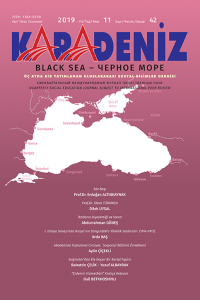Öz
ÖZ
Sanat doğanın bir yansıması değil, doğanın
eksik bıraktığını tamamlayan, evrendeki boşluğu dolduran, yaratımı
olgunlaştıran ve nihai güzelliğine erdiren edimdir. Doğaya duyulmayan hayranlık bu yüzden sanat
eserine duyulur. Bir gün batımına verilmeyen bir sanatçıya verilmiştir. Bir
çiçekte olmayan bir sanatçıdadır. Yağmurun sunmadığını sunar sanatçı. Toprağın
vermediğini verir. Suyun belki sahip olmak için yalvaracağı şeye sahip olan
sanatçıdır. Evrenin hatasını telafi eden sanatçıdır. Sanat taklit değil,
taklidin tenkididir. Doğa ya da evren DNA aracılığıyla sürekli kendini taklit
eder. Sanat, bu taklit zincirini kıran düşüncedir. Sanat yaratımın son
noktasıdır. Göğün son rengi, yerin son şekli, çiçeğin son yaprağı, güneşin son
ışığı, kelebeğin son kanadı, dağın son taşı, denizin son damlası, insanın son
noktasıdır. Bu açıdan sanatı bir üretim değil de bir yaratım olarak ele almak
yerinde olacaktır. Sanat: anı sonuna dek yararak zamanın, atomu son haddine
kadar yararak mekânın ötesine taşınmak gibi bir ontolojik derinliğin işçisidir.
Sanat bu yarma işleminin nöro-estetik boyutuna temas eder. Sanat biçimi
bozarken biçimsizi biçimleme kastı taşır. Bu açıdan iktidara karşı mesafeli
olmak durumundadır. Belki de bu yüzden “sanatın ve sanatçının konumladığı yer ana
yollara uzaktır”. Foucault ’un bilgi bağlamında ortaya koyduğu özne-iktidar
anlayışı sanatın değer dizgelerini yeniden sorgulama ihtiyacını gündeme
getirmiştir. Özne üzerinden kurgulanan iktidar, iktidarın kurguladığı özne
birbirini yaratırken kırılması neredeyse imkânsız bir denklem çıkar ortaya.
Sanat bu denklemin neresinde durmaktadır? Sanatın bilgiyle, özneyle ve
iktidarla olan ilişkisi sanatında kendi içinde kurgulanmış bir iktidar
sanatçının da kendi içinde kurgulanmış bir özne olma ihtimalini akıllara
getirmektedir. Sanatı ve sanatçıyı kendi sosyolojisi içinde değerlendirecek
olursak dilin ve imgenin bir noktaya evrildiği her yeni eleştirinin kendi
kurgusunu dayattığı açıkça görülmektedir. Aslında farkında olmadan bir ikinci,
üçüncü, dördüncü… anayol ortaya çıkmakta hatta belki ilk anayol diğerlerine
nazaran ıssızlaşmaktadır. Bu çalışma iktidarın diyalektiğini ontoloji ve sanat
bağlamında irdeleme çabasını içermektedir.
Anahtar
Kelimeler: Yaratım, Bilgi, İktidar, Sanat, Anarşizm,
Faşizm, Üretim
ABSTRACTArt is not a reflection of nature, it is the act that complements the incomplete nature of nature, fills the void in the universe, matures the creation and achieves its ultimate beauty. Therefore, the nature unheard admiration heard in art. He was given to an artist who was not given a sunset. In an artist who is not in a flower. The offer artist when not present the rain. Gives when not gives the soil. He is the artist who has what it will beg to be possessed water. He is the artist who compensates for the error of the universe. Art is not imitation, criticism of imitation. The nature or the universe mimics itself constantly through DNA. Art is the idea that breaks this imitation chain. Art is the ultimate in creation. The last color of the sky, the final shape of the earth, the last leaf of the flower, the last light of the sun, the last wing of the butterfly, the last stone of the mountain, the last drop of the sea, the last point of the human being. In this respect, it would be appropriate to consider art as a creation rather than a production. Art: It is the worker of an ontological depth such as split moment until the end of the time, split the atom to the end space. Art refers to the neuro-aesthetic dimension of this splitting process. While the art breaks down the form, it implies the shaping of formless. In this respect, he has to be distanced from power. Perhaps this is why art and the artist are located far from the main roads. Foucault's concept of subject-power in the context of knowledge raised the need to reinterpret the value systems of art.
The power constructed over the subject emerges as an almost impossible equation to break when the subject created by the power is creating each other. Where does art stand in this equation? The relation of art with knowledge, subject and power, within art itself be fictionalised power, brings to mind the possibility that the artist is be fictionalised a subject. If we consider art and artist within its own sociology, it is clear that every new criticism where language and image evolve to a point imposes its own fiction. In fact, unconsciously a second, third, fourth main road is emerging or perhaps the first main road is desolate compared to others. This study includes an attempt to investigate the dialectic of power in the context of ontology and art.
Keywords: Creation, Knowledge, Power, Art, Anarchism, Fascism, Production
Kaynakça
- ALTHUSSER, Louis. (1991). İdeoloji ve Devletin İdeolojik Aygıtları. (Çev: Y. Alp- M. Özışık). İletişim Yayınları: 3. Basım. İstanbul.
- BOUDRİLLARD, Jean. (2006). Kusursuz Cinayet. (Çev: Necmettin Sevil). Ayrıntı Yayınları: İstanbul.
- BOUDRİLLARD, Jean. (2008). Simülarklar ve Simülasyon. (Çev: Oğuz Adanır). Doğu-Batı Yayınları: Ankara.
- FOUCAULT, Michel. (1992). Hapishanenin Doğuşu. (Çev: M. Ali Kılıçbay). İmge Kitapevi: Ankara.
- FOUCAULT, Michel. (2005). Büyük Kapatılma. (Çev: İ. Ergülen-F. Keskin). Ayrıntı Yayınları: İstanbul.
- NİETZSCHE, Frederic. (1991). Putların Alacakaranlığı. (Çev: Hüseyin Kaytan). Akyüz Yayınevi: İstanbul.
- NİETZSCHE, Frederic. (2009). Tan Kızıllığı. (Çev: Özden Saatçi). Say Yayınları: İstanbul.
Ayrıntılar
| Birincil Dil | Türkçe |
|---|---|
| Bölüm | Makaleler |
| Yazarlar | |
| Yayımlanma Tarihi | 30 Haziran 2019 |
| Gönderilme Tarihi | 28 Mayıs 2019 |
| Yayımlandığı Sayı | Yıl 2019 Sayı: 42 |


